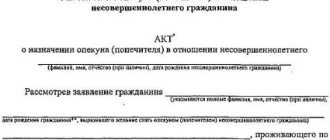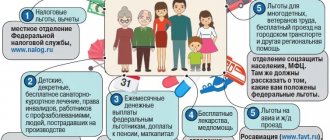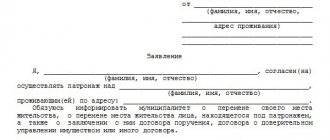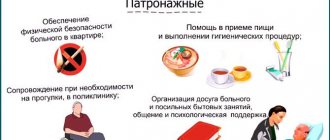Last modified: January 2021
Sometimes life circumstances lead to the need to resolve the issue of identifying minor children who are not orphans. Guardianship is required not only in cases of deprivation of parents' rights or their serious illness and disability. A long business trip and forced absence may lead to the registration of guardianship of a child with living parents.
The process of taking custody of a child with living parents differs little from a similar procedure due to their physical death. However, when organizing guardianship of a child with parents, some nuances must be observed.
Guardianship and trusteeship: concept
Guardianship is a form of placement for children under 14 years of age. Guardianship is established under an agreement drawn up with the participation of the guardianship and trusteeship authorities. If the child is over 14 years old, guardianship is established instead of guardianship.
Let's look at the main differences between the two concepts:
| Condition | Guardianship | Guardianship |
| Child's age | Up to 14 years old | From 14 years old |
| Circle of people | Guardian and ward | Guardian and ward |
| Disposal of the ward's property | The guardian has the right to make any transactions on behalf of the child, with the permission of the Educational Inspectorate | The guardian does not act on behalf of the minor, but gives consent to transactions |
| Responsibilities | In fact, the guardian fulfills parental obligations | The range of rights and responsibilities is smaller |
| Responsibility for the child's actions | The guardian is fully responsible for the child's actions | Solidarity - both answer |
| Cohabitation | Necessarily | With the permission of the OiP, traveling with a child over 16 years old is allowed |
Guardianship and trusteeship have one thing in common: the mandatory conclusion of an agreement with the participation of the PA. Until the child reaches adulthood, important transactions and actions are carried out only with the consent of this government agency.
List of documents
From December 2021, the candidate submits a minimum package of documents to the district guardianship department. The remaining information is requested by specialists as part of interdepartmental cooperation within 5 days from the date of submission of the application. The list includes:
- a copy of a personal document (passport);
- certificate of income (on the amount of pension, 2nd personal income tax, from the Central Employment Tax Fund, certificate from work in free form);
- health report;
- autobiography;
- written consent of all family members of the candidate;
- document on marriage (conclusion, divorce);
- certificate of completion of school for foster families.
All documents are valid for 12 months. The exception is a medical certificate, it is valid for 6 months.
Types of guardianship
There is a common misconception in Russia that guardianship is only granted to children whose parents have died or been declared incompetent. In fact, this is not true: the mother and father can give the minor temporary custody under certain circumstances.
Let's look into this issue and find out when and what type of guardianship is issued.
Permanent guardianship
Permanent guardianship is a form of placement for a child left without parents due to their death or deprivation of parental rights. He is placed with a foster family or one guardian until he reaches adulthood.
Also, permanent guardianship is issued for adult incapacitated citizens who require help and care. For parents who want to place their child under guardianship for a while, this method is not suitable.
Temporary guardianship
According to Art. 13 Federal Law No. 48, temporary guardianship is established over children upon a joint application of the parents if they:
- They work on a rotational basis and leave for long periods of time;
- Are undergoing long-term treatment in hospital;
- They move to another city or country to look for work, study, or care for a seriously ill relative.
Temporary guardianship can be assigned when a teenager is sent to study abroad or to another city. The main condition is that the reason must be valid.
When parental rights are limited, temporary guardianship may be established until the expiration of the period specified in the court decision.
Note! When assigning temporary guardianship, the AOiP pays close attention to the relationship between the guardian and the child. The latter's opinion will be taken into account. If during the conversation it becomes clear that the minor has a negative attitude towards the guardian, the parents will be required to choose another candidate.
The opinion of a child over 10 years old is taken into account without fail. If he is under 10 years old, the POiP staff will still have a conversation with him and find out his attitude towards the guardian.
Preliminary custody
The appointment of preliminary guardianship is regulated by Art. 12 Federal Law No. 48. It is used in emergency cases when a child or an adult incompetent citizen is left without parental assistance.
Preliminary guardianship and trusteeship help prevent the placement of a child in an orphanage. It is always established on a non-permanent basis, but, unlike temporary guardianship, the least requirements apply to guardians, and registration occurs as quickly as possible. Another difference is the inability to dispose of property on behalf of the ward or give consent to transactions with him.
The preliminary guardianship agreement is drawn up for a period not exceeding 6 months. In exceptional cases, it is extended to 8 months. If the guardian does not register the status of a permanent representative of the minor, the latter POiP continues to look for a guardian or guardian on a long-term basis.
Joint custody
The concept of “joint custody” does not exist in Russian legislation.
What people usually mean here is:
- Registration of guardianship of a child by two spouses who are not his parents;
- A minor living with his parents after a divorce, when the child lives for a week with one, a week with the other.
In the first case, clause 7 of the Decree of the Government of the Russian Federation of May 18, 2009 No. 423 is applied, according to which several guardians are appointed for a minor in exceptional cases. If a married couple wants to establish guardianship, an agreement is usually concluded with one of the spouses, and the other gives written consent. Joint custody will require a joint application from both applicants.
In the second case, guardianship is not formalized. If parents, after separation, want the child to live with each of them in turn, instead of guardianship, they need to determine the place of residence and order of residence by concluding an agreement with a notary or going to court.
Important! Parents cannot obtain guardianship over their children - they already have responsibilities and rights under Chapter. 12 of the RF IC, which are much broader than those of guardians.
Guardianship of a child from an orphanage
How to obtain guardianship for an elderly person?
Who is eligible
Guardianship authorities are strict about the choice of a guardian, because a child is not a toy that can be temporarily taken or returned. Studying the question of what is needed for guardianship of a child must begin with the guardianship authorities. However, it is quite easy to successfully qualify as a guardian if the person is over 18 years of age and found to have legal capacity.
Only citizens whose capabilities or characteristics give rise to well-founded doubts by the supervisory authority will not be able to adopt a child.:
- deprivation or restriction of the rights of a parent/adoptive parent in the past;
- having a criminal record for crimes against the life and health of people, violence, illegal and immoral actions against children and other categories of citizens;
- the presence of drugs, alcohol or other forms of addiction;
- past loss of guardianship;
- diagnosis of serious diseases that threaten the health of others, as well as cancer;
- mental disorders, incapacity due to disability.
An applicant for guardianship must complete a special course for guardians, without which permission to take care of the child is impossible. The exceptions are relatives who have already established warm relationships with their wards, as well as former guardians.
If citizens of foreign countries apply to the supervisory authority, an additional restriction on the sexual orientation of applicants is introduced, excluding citizens in a same-sex marriage.
Why should parents obtain temporary guardianship?
Parents often work on a rotational basis, which involves long trips. During this time, children stay with grandmothers or other close relatives. Legally, the latter are not representatives of the child, so a guardianship agreement is needed to be able to represent his interests in several situations:
- Giving consent to complex surgical interventions;
- Conducting transactions with property;
- Receiving payments for a child.
If there is no agreement, it will not be possible to provide timely assistance to a minor in resolving important issues.
Legislative regulation
If you decide to arrange guardianship or guardianship over your minor relative, then you need to understand that this process is not only quite lengthy (collection of documents, passing a medical examination, in some cases, litigation, etc.), but also requires great responsibility in further. Therefore, it would be advisable for an applicant for the role of a guardian or trustee to carefully weigh the pros and cons before formalizing guardianship.
How to obtain guardianship of a child with living parents: step-by-step instructions
For living parents who have not been deprived of parental rights, temporary guardianship is issued.
They choose a potential guardian on their own, then apply to the POiP to obtain permission. Step-by-step procedure for registering guardianship:
- Parents apply to the Office of Educational Inspectorate at the place of residence of the caregiver with a joint application. Consent is provided by the guardian.
- The future guardian undergoes a medical examination and provides a conclusion to the OUiP.
- OOiP employees carry out an inspection of housing conditions within 10 days from the date of the application, within 3 days from the date of the inspection an act is drawn up, and a decision is made to appoint a specific citizen as a guardian.
Based on the decision, a guardianship agreement is concluded between the parties with the participation of the OOiP.
Requirements for a guardian
Citizens of legal age of legal age have the right to become guardians. Priority right is given to close relatives: grandparents, sisters, brothers, aunts, uncles.
The contract is not executed if:
- There is a conviction for serious or especially serious crimes;
- Serious illnesses have been diagnosed;
- There is no permanent source of income;
- The applicant was previously deprived of parental rights, removed from the duties of a guardian, and the adoption was canceled due to his fault;
- There is no permanent place of residence;
- There is no consent to guardianship from other family members over 10 years old living with the applicant in the same living space.
If there is at least one reason, the guardianship agreement will not be issued. Group 1 disabled people cannot be guardians.
Documentation
When contacting the OiP, parents must provide:
- Application for establishment of guardianship;
- Passports, SNILS;
- Agreement with the future guardian;
- Marriage registration certificate (if available);
- Documents confirming the presence of valid reasons for establishing temporary guardianship: certificates from the place of work, educational institution, hospital.
When applying, a potential guardian provides:
- Statement;
- Passport, SNILS;
- Certificate of ownership or lease agreement;
- Certificate of no criminal record;
- Autobiography;
- Medical certificate confirming the absence of dangerous diseases;
- Marriage certificate;
- Written consent of family members.
Documents are provided in originals. Copies are made from them by a POiP employee, and the originals are returned to the owners.
Statement
The application from parents must contain the following information:
- FULL NAME. director, name and address of the organization;
- Full name, date of birth, place of residence, passport details of parents;
- Valid reasons why temporary guardianship needs to be appointed;
- The period for which guardianship is assigned;
- Full name, gender, date of birth, residential address, information from the passport of the potential trustee;
- Signatures of the parties.
The document is provided in a single copy along with the consent of the candidate for guardianship.
Sample application from the parents of a minor citizen to appoint a guardian for him: alt: Application from the child’s parents for temporary guardianship
Agreement
The agreement is drawn up by the parents and guardian indicating the following information:
- Full name, date of birth, residential address, passport details;
- Details of the OOiP act on the appointment of a guardian;
- Start and end dates of guardianship;
- Features of the order, the amount of money allocated by parents for the maintenance of the child;
- Rights and obligations of the parties;
- Grounds for termination of the contract.
The agreement is drawn up in three copies. One stays with the parents, the second - with the guardian, the third - in the OOiP.
Sample guardianship agreement: alt: Agreement on guardianship of a minor citizen
Autobiography
A short autobiography is provided by the person wishing to become a guardian.
The document contains data:
- Full name, series and number of passport, residential address, date of birth;
- Telephone;
- Education, date of diploma;
- Place of work, position;
- Periods of work in different organizations (can be written out from the work book);
- Family status. If the applicant is married, information about the spouse and children must be indicated;
- Information about relatives living in the same living space;
- Hobbies, preferred ways of organizing leisure time.
At the end there is a signature.
Sample autobiography of a guardian: alt: Sample autobiography
Guardian's application
The potential guardian is also provided with a statement reflecting the following information:
- Full name, residential address, information from the passport;
- FULL NAME. parents;
- Full name, date of birth, residential address;
- Request for the issuance of a conclusion on the establishment of guardianship;
- Duration of guardianship;
- Reasons for temporary guardianship;
- Date of registration and signature.
The application is submitted to the POiP at the place of residence of the guardian.
Sample application from a guardian for temporary guardianship: alt: Application from a guardian for temporary guardianship
Registration deadlines
Registration takes 10-15 days. An inspection is carried out within 10 days, a conclusion is issued after three days.
Possible reasons for refusal
Having considered the information provided, the guardianship authority may decide that the citizen is unable to be a candidate for guardianship. In addition to the above reasons, the following options are possible:
- Documents provided that have expired. A certificate of income from the Ministry of Internal Affairs, a certificate of rent is valid for a year, a medical report is valid for 6 months.
- A complete list of information is not provided.
- The candidate has more than 8 children (blood and wards combined). If there is no additional permission from the guardianship authority for adoption into the family.
The following are not reasons for refusing to appoint guardianship:
- Absence of a spouse. The law allows single citizens the opportunity to be surrogate parents.
- Size of living area. There are currently no set standards for caregivers. However, conditions must be met for the separation of children of different sexes.
- Caregiver's income level. The law provides for regular receipt of funds, but does not specify the amount.
If the refusal to issue an opinion is unfounded, the citizen has the right to appeal it in court.
Guardian's responsibility
According to Art. 26, guardians are responsible for transactions with children’s property made on their behalf. Liability is also provided for damage to the property of the ward through the fault of the representative.
If the guardian does not fulfill the duties of protecting and managing the property, the POiP draws up a report on this and submits a claim for compensation for losses. A dishonest attitude towards guardianship may become grounds for the cancellation of guardianship.
For illegal actions or inaction, guardians are liable in accordance with the Civil Code, the Criminal Code of the Russian Federation, and the Code of Administrative Offenses of the Russian Federation.
Documentation for the child
To register guardianship upon application, documents for the child are prepared by the parents; for minors, the OBP is prepared by specialists from the district department. The general list includes:
- personal documents (birth certificate, passport);
- medical report;
- information about education (school affairs, characteristics);
- extract from the house register;
- certificate of family composition;
- information about close adult/minor relatives;
- property documents;
- agreements for opening bank accounts;
- medical insurance;
- SNILS;
- information about pension and/or disability (if available).
A lawyer's answers to questions about registering guardianship with living parents
Is it possible to become a guardian if you don’t have your own home?
Yes, owning real estate is not a prerequisite, but a lease agreement will be required.
Does pre-custody guardianship need to go to training school?
No. When establishing preliminary or temporary guardianship, no training is required.
Can a guardian terminate his powers at his own request?
Yes, to do this, it is enough to submit an application to the OOiP.
Is it possible to establish a preliminary one over an incapacitated person?
Yes, preliminary guardianship is established in such cases.
Can a temporary guardian sell the home of the child under his guardianship?
No, this option is not provided.
Legal requirements
Federal legislation provides for the following requirements for a citizen wishing to accept a minor into his family:
- having a regular income;
- availability of living space;
- satisfactory state of health.
The law does not oblige the candidate to have an official place of work. However, he must have a regular income (pension, income from securities, unemployment benefits).
Important! There is no minimum income level.
Residential premises can be owned, rented, owned by a spouse, or provided for free use. The fact of availability of living space must be documented.
Health requirements are established by the Order of the Ministry of Health of the Russian Federation. The candidate cannot have cancer, HIV, or be registered with a psychiatrist or narcologist.
Registration procedure
Documents can be provided as follows:
- personally;
- through the website of the district guardianship department;
- through the State Services portal;
- through MFC.
When applying in person, you must prepare originals and copies of documents. The specialist will compare the information provided and return the originals.
If the application was submitted through the MFC, the operator scans the documents. The information is equivalent to that submitted in the original.
When submitting an application using electronic services, documents are attached in scanned form. However, when conducting a survey of living conditions, the candidate is required to provide originals for comparison. If the required information is not available, the citizen will be refused.
Patronage
Finally, there is another additional form of assistance to citizens, such as patronage, which is a type of trusteeship (Article 41 of the Civil Code of the Russian Federation).
Its features are as follows: an adult and capable citizen, who for health reasons is not able to defend his rights or fulfill his duties, has the right to use the services of an assistant assigned to him by the guardianship authorities. At the same time, the ward has the right to refuse his help at any time.
The legal features of this form of assistance as patronage are as follows:
• Unlike guardianship of the incapacitated, an assistant acts on behalf of a person based on a contract. The citizen to whom an assistant is assigned is not deprived of his legal capacity and, if necessary, has the right to act independently;
• The assistant can dispose of the ward’s property only with his consent and only within the limits established by the agreement concluded between them;
In this case, the appointment of an assistant is made with the mutual consent of both the citizen himself and the person who will provide patronage. These features largely link patronage to representation or service provision.
Deadlines for consideration of applications
Currently, there are deadlines established at the legislative level during which a guardianship permit is issued. As a rule, a candidate's application is considered within one month from the date of application. Additionally, the trial process, which lasts two months, and in addition, the entry of the court decision into legal force, which occurs three days after its issuance. This situation is provided for in accordance with the current regulatory framework, but in practice the deadlines may increase. Either, on the contrary, be reduced under appropriate circumstances, or the need to submit additional documentation.








